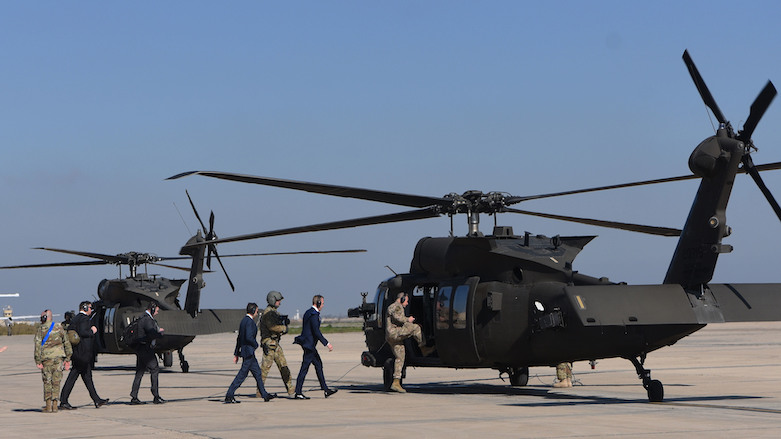Top US defense official makes surprise visit to Iraq

WASHINGTON DC (Kurdistan 24) – Acting US Secretary of Defense, Patrick Shanahan, paid a brief, unannounced visit Tuesday to Baghdad, where he met with Iraqi Prime Minister, Adil Abdul-Mahdi.
Although Iraq’s elections were held in May, ten months ago, the new government still lacks Defense and Interior Ministers, because of disagreements about prospective candidates among the major parliamentary blocs.
Abdul-Mahdi was the only Iraqi leader whom Shanahan met, Pentagon Spokesman Cmdr Sean Robertson explained to Kurdistan 24, and Shanahan left without visiting Erbil. Thus, it seems he has yet to see the Kurdistan Region, as this was, reportedly, Shanahan’s first trip to Iraq (as well as Afghanistan, which he visited the day before.)
Shanahan’s discussions with Abdul-Mahdi focused on “the mission of defeating ISIS,” according to a summary provided journalists by Robertson.
The two leaders also discussed “the need to further develop” the capabilities of Iraqi security forces, Robertson explained, as he stated that Shanahan had “reaffirmed the US commitment to an independent, sovereign Iraq,” capable of defending itself.
The US has approximately 5,200 troops in Iraq, and their continued presence has become a hot-button issue, as some Iraqi parliamentarians clamor for their expulsion. The issue was exacerbated by US President Donald Trump’s recent statement that while he was withdrawing forces from Syria, he would keep them in Iraq, where they could watch Iran, which he described as “a real problem.”
However, the Pentagon has been careful to define its work in Iraq as combatting the Islamic State, along with advising and training Iraqi forces, as Shanahan did on Tuesday, and as outgoing CENTCOM Commander, Gen. Joseph Votel did in testimony last week, before the Senate Armed Services Committee.
Trump has ordered the withdrawal of the 2,000 US troops now in Syria and suggested that a significant number might be shifted to Iraq, which would increase the importance of the US military facility at Erbil International Airport.
He has also said that he wants to withdraw at least some of the 14,000 US troops currently in Afghanistan, although Shanahan told reporters that he had not received any orders to cut forces there.
Trump’s predecessor, Barack Obama, also grew tired of America’s seemingly endless wars in the Middle East, although Obama focused on disengaging from Iraq, rather than Afghanistan.
It is probably difficult now to understand Washington’s extraordinary confidence at the time of the 9/11 attacks. America was coming off the decade of peace that followed the 1991 collapse of its major rival, the only other superpower, the Soviet Union.
Immediately after the 9/11 attacks, even conservative establishments, like the Heritage Foundation, clamored for a “long war.” To many, it seemed that such a war would be relatively easy. After all, the US had beaten the Soviet Union, so what challenge could the Middle East pose?
Indeed, that is what the Bush administration quickly came to believe, once it had recovered from the shock of 9/11. Already in December 2001, the administration believed that it had won in Afghanistan, after just a few months of warfare. And in May 2003, it believed that it had won in Iraq, after a similarly brief fight.
Nor, in their planning, was that to be the end. Following the US “victory” in Iraq, the Pentagon prepared for yet more wars.
In 2015, Lt. Gen. Daniel Bolger (US Army, Retired) wrote a memoir, Why We Lost: A General’s Inside Account of the Iraq and Afghanistan Wars. As Bolger explained—in a section entitled “Hubris,” followed by another, entitled “Nemesis,” the Greek terms for pridefulness and its consequences—the Pentagon withdrew its top commanders from Iraq in the summer of 2003 in order to prepare for more wars.
The original team in Iraq was replaced by the B-team: new, less capable officers, with consequences that are familiar.
Against this background, “Trump’s frustration is understandable,” Paul Davis, a former Pentagon analyst and currently a Senior Fellow at Soran University, told Kurdistan 24.
However, Davis, pointing to Gen. Jack Keane’s recent interview with Fox News, cautioned that a “too-quick withdrawal” of US forces could easily lead to a resurgence of the Islamic State and “just repeat Obama’s mistake.”
